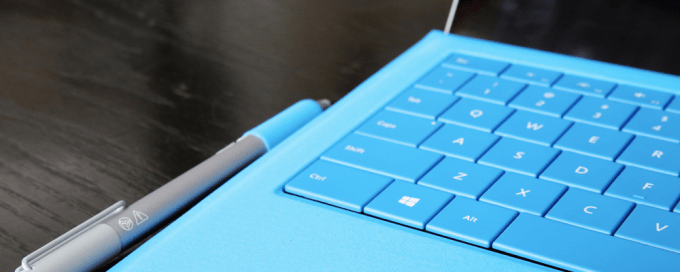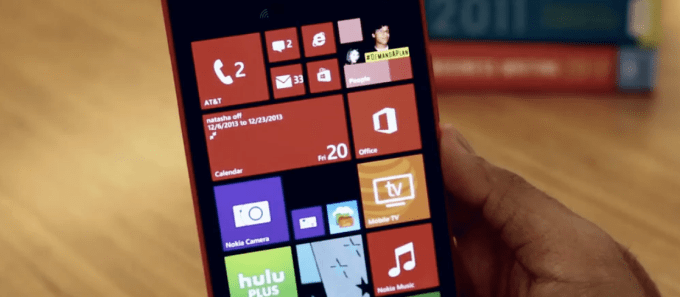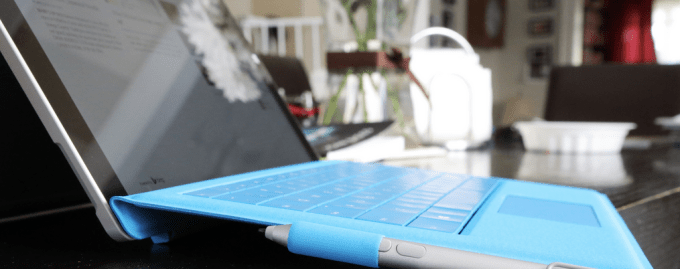So what’s this new Microsoft strategy you’ve been hearing about?
According to CEO Satya Nadella, the company is three things: Office 365, Windows and Azure. “That’s it,” the executive recently quipped. Given that narrow focus, how do the company’s massive and recent bets on hardware fit into the picture?
Microsoft has poured billions in its Windows Phone project, even before you take into account its purchase of Nokia’s hardware assets. And Surface has been a damn expensive project, though one that has been showing some stronger signs of life in the most recent quarter.

We recently sparred over whether Microsoft’s hardware strategy makes a wit of sense. Should the company get out of the hardware game and go all in on services or does its hardware play make sense — especially since it’s put so much money into it?
Ron Miller is up first:
If Microsoft Wants To Be A Services Company It Needs Total Focus
Microsoft has been making moves lately that suggest it wants to be a service company, but if that’s the case, it’s going to take total focus.
For example, last week, Microsoft surprised some people when it announced a deal with Dropbox to embed Dropbox storage inside of Office and allow Dropbox users to edit documents from Dropbox. Microsoft has services that do this, and the old Microsoft would have protected that internal business over any other business opportunities. But this isn’t the old Microsoft. It’s the new service-focused Microsoft and it intends to go where the users are, regardless of what impact that has on its own products.

In another example, this spring Microsoft announced a deal with Salesforce.com around its CRM tool. Once again, Microsoft has a CRM service in Microsoft Dynamics, but it ignored its own products, because it wanted to put the platform over the product (or the many over the one as Spock might say).
If you’re beginning to sense a pattern here, you’re absolutely correct. As my colleague Alex pointed out in a series of posts recently, Microsoft is trying to get leaner and more focused, so it’s putting its eggs in one of three baskets: Windows, Office 365 and Azure — a core OS, a software service platform, and an infrastructure platform, respectively. That’s it.
It’s actually a brilliant plan if they stick to it, but they seemingly can’t let go of some things that are getting in the way of succeeding.
If those three pieces are truly the core of this new Microsoft, they need to get out of the hardware business because it doesn’t really fit any of those buckets, does it? When you look back at Microsoft’s hey day, it was successful (all antitrust business aside) because it concentrated on what it did well.
It was a Windows/Office business with some nice enterprise pieces such as Windows Server, Exchange Server, Active Directory and so forth. What you didn’t see was Microsoft-branded PCs and servers. Microsoft created a core set of products and let everyone build stuff on top of that and it was tremendously successful. They fed the hardware and software ecosystem and didn’t try to compete in any direct way with their OEM channel.
(And yes I know they made keyboards and mice, but that was a small part of the business.)
Today, Microsoft is trying desperately to sell phones and tablets. It has no business doing that if it truly wants to stick to that core mission. Sure, the numbers have gone up nominally last quarter and every Microsoft fan let out a loud cheer and let everyone know it, but ultimately when you look at the numbers, Microsoft isn’t even on the radar of companies like IDC who track tablet sales and they barely register on the phone side.
What’s the point of wasting time and resources producing these devices if they aren’t central to the services mission, and they aren’t central to that mission. You could argue of course that Microsoft needs these devices for its mobile strategy to work, but what it needs is to get more hardware companies interested in the platform and the services that run on it.

And as for Xbox, yes it’s much more successful in its market, but it has absolutely nothing to do with the core mission. Sorry. I don’t see a place for it in the new Microsoft and if Microsoft were smart, they would spin it off or sell it.
As R Ray Wang from Constellation Research told me last spring after the Microsoft-SFDC announcement, for Microsoft everything now comes down to the platform. “If you view Microsoft as a platform company, they will make decisions [from now on] in the interest of the platform,” Wang told me at the time.
And if that’s true, Microsoft needs to get out of the hardware business, and soon.
Next up, Alex Wilhelm:
You Don’t Back Half A Horse
Ron is correct to state that Microsoft is a services company now, or at least a company that has charted a path in that direction. I don’t completely disagree with his analysis from my own perspective, but I do think that there is a bit of a dissonant nuance at play when you take into account Microsoft’s broader strategy, as best as I can understand it.
Broadly, I think that hardware can be viewed in a support role to the company’s primary efforts, and that the company is pretty well pot committed, to a certain extent. Also, the company is finally seeing cracks of sunlight in formerly dim financial results.
First up, the three core points of Microsoft appear to be set: Office 365, Azure and Windows. Microsoft CEO Satya Nadella recently stated that he views Windows 10 as a service, so that makes the company’s three core efforts each land decidedly in the services column.
Hardware fits into this in three ways: Without its Windows Phone business, there is no Windows Phone-as-a-platform. If it abandons Surface, it would leave behind a nearly profitable business that does a fine job showcasing Windows, and provides a template for its OEM partners to build better hardware; and if it did drop hardware altogether, it would greatly deprecate its gaming efforts.

Why would it matter if there is no Windows Phone, given the hardware line’s limited sales, when compared to iOS and Android? It appears that Microsoft is betting that when Windows 10 comes to fruition, and Windows Phone becomes a full member of the Windows family, it wants to make a developer proposition that extends from the smallest screens to the largest — build once deploy everywhere I’d think works better when your “everywhere” is largest.
A short aside to gaming here is useful: Gaming is the largest and most popular category of apps on Windows Phone. If Microsoft walked out of the hardware game, there would essentially be no Windows Phone handsets in the market, and thus there would be no Windows Phone unit volume, and thus sales and downloads of games would begin an inexorable decline. So, if Microsoft leaves hardware, attention from gaming developers that it wants very much for Windows 10 would be cut. That would be tough.
Moving forward, regarding Surface, I agree that if the business had failed to produce a better-selling device in the Surface Pro 3, the project would have been a decent candidate for cancellation, simply because it had minor revenues — when compared to the larger Microsoft top-line segments — and therefore less importance. Also keep in mind that Surface, in terms of unit volume, is a slim slice of total PC volume, making it not mission critical for the PC market in terms of short-term survivability. However, the Surface Pro 3 has done two things: Grown Surface revenue greatly while moving closer to GAAP profitability, and has provided a reference design for how to build touch-PCs that are useful in the Windows 8+ context.
Given that, why cut it loose? The company expects sequential quarter unit volume growth it said in its earnings, so we could see even higher revenue in the current quarter. Why cut a nearly profitable business that could do more than $3 billion a year in top line?
Regarding Xbox, the chance that Microsoft does away with it is nil to begin with, but it is worth noting why: It has massive buy-in among younger users that might not otherwise have lots of experience with Microsoft products, which could help the company gain mindshare among the people down the road that are likely to buy computers.
And again, the gaming bit: If Microsoft dropped its Xbox business, it would greatly harm its relationship with gaming companies, firms that will be able to quickly and easily deploy their titles across the unified Windows 10 platform, where the company would love to see popular Xbox titles land to help support the unified Windows Store.
Surface almost makes money, Phone will lose money for only another fiscal year or so, and Xbox is a hit for the company. And, given that each supports the key coming Windows 10 platform, and leans on the company’s Azure computing service — making them useful customers, if in-house — I don’t think that they are on the chopping block.
If gobs of money are hemorrhaged, expect cuts. But for now, Microsoft has spent something in the neighborhood of $10 billion — using back of the envelope math — on buying Phone, Phone losses and Surface losses, not to mention Surface development costs pre-launch. You just don’t throw that away.
Don’t aQuantive things that might work, bro.
